General
Intentionality Key to Nurturing More Women Leaders
Published
4 years agoon
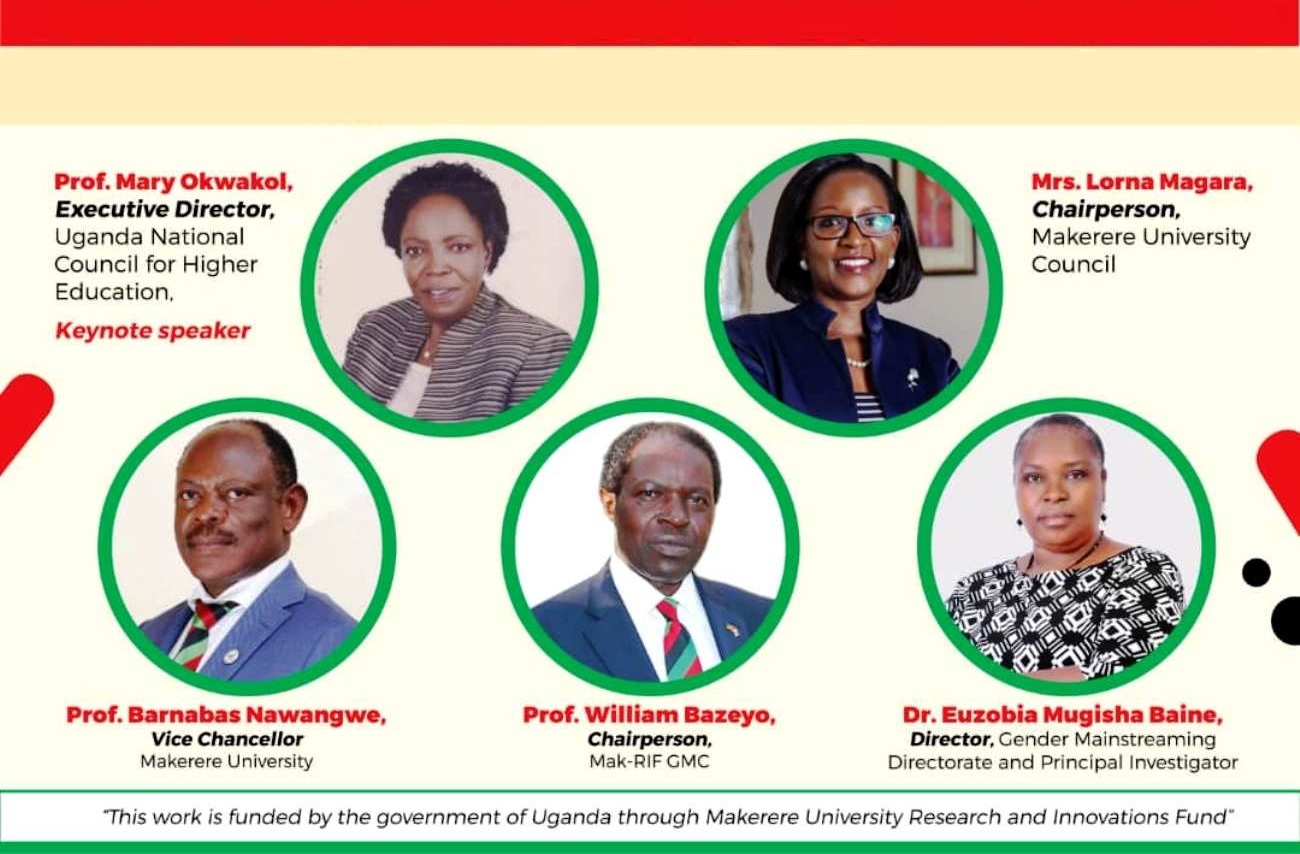
The Gender Mainstreaming Directorate (GMD), Makerere University on 14th September 2021 presented findings from phase one of the study on Enhancing Women’s Participation and Visibility in Leadership and Decision-Making Organs of Public Universities in Uganda through Action Research. The study team led by the Director GMD and Principal Investigator (PI), Dr. Euzobia Mugisha Baine also consists of Assoc. Prof. Consolata Kabonesa, Dr. Anna Ninsiima, Ms. Frances Nyachwo, Ms. Susan Mbabazi and Mr. Eric Tumwesigye.
The team is also made of coordinators from participating Universities such as Busitema University-Ms. Elizabeth Birabwa, Kabale University-Sr. Dr. Eva Tumusiime, Mbarara University of Science and Technology (MUST)-Dr. Specioza Twinamasiko, Muni University-Ms. Amandru Stella Wawa, and Gulu Univeristy-Sr. Rosalba Aciro.
Funded by the Government of Uganda through the Makerere University Research and Innovations Fund (Mak-RIF), the study was inspired by the fact that women are persistently few in numbers as staff, more so in leadership and decision-making organs of Ugandan Public Universities. “This is despite all the various efforts at national and international levels; the numbers are not growing as fast as needed to meet development goals of the country” explained Dr. Euzobia.
Based on this background, the study team therefore sought to conduct a situational analysis of the gender terrain of the six public universities to obtain baseline information encompassing the composition of governance and leadership organs and senior staff by sex, as well as a needs assessment and profiles of potential mentors and mentees.
Furthermore, the team sought to explore the capacity to conduct gender-responsive research as well as the role of male staff engagement in gender equity interventions within the universities as the drivers of development.
Dr. Mugisha-Baine shared that results of the baseline would then be used to design participatory training manuals or guides on gender and leadership. The manuals would cover; Institutionalized mentorship, How to conduct gender-responsive research, gender and equity budgeting, among others.
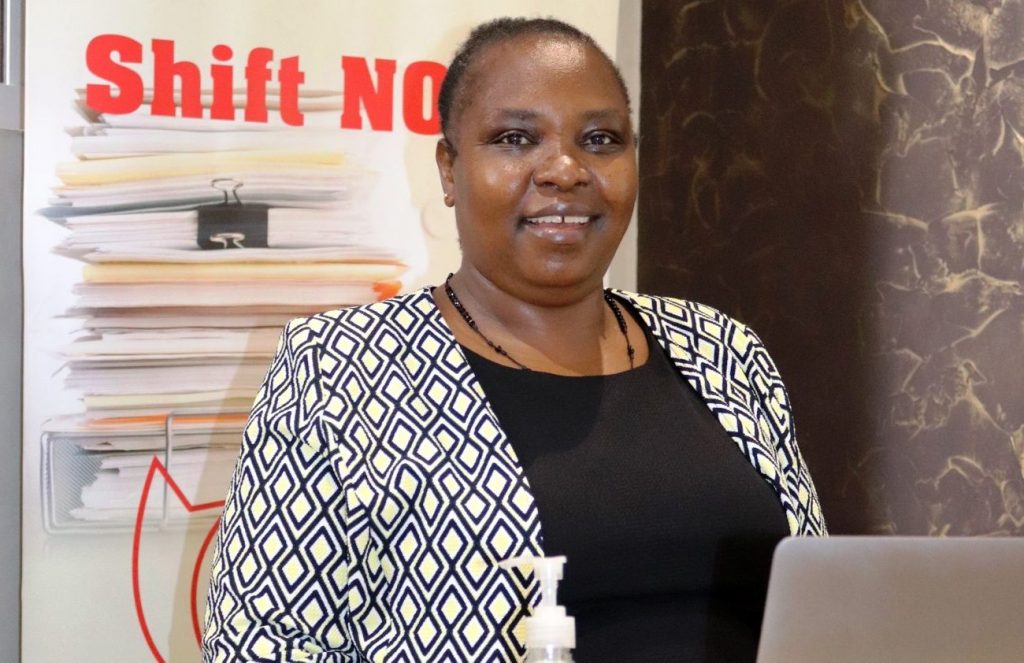
“Within these manuals, we shall have a male staff engagement strategy in gender equity interventions in universities” she explained.
The development of the aforementioned materials would then be followed by their adoption and use to build capacity for women not only in leadership of participating and other public university but also beyond. “We shall periodically evaluate whether the capacity we have built has influenced women’s participation in leadership and decision-making organs of the university” supplemented the PI.
The capacity building trainings for women, it is envisaged, will lay the foundation for the formation of a functional Uganda University Women’s Think Tank, starting with the six participating universities. Dr. Mugisha Baine added that through this Think Tank, a monitoring and tracking system for gender representation in recruitment, promotion, retention/turnover and leadership of public universities shall be established and maintained.
At the conclusion of phase one, the study team had drafted participatory training manuals in gender and leadership with content on; gender specific critical analysis of the leadership spectrum of public universities, positioning of individual women within the institutional framework and strategies for their advancement, gender equity advocacy in the university setting, institutional mentorship, building capacity in conducting gender-responsive research, among others.
“This content will be validated by the participating universities before the actual research training is conducted” added the PI.
On behalf of the research team, Dr. Mugisha Baine thanked the Government of Uganda for providing the resources that facilitated phase one of the study and prayed that the Mak-RIF Grants Management Committee (GMC) would support the next phase of capacity building.
Speaking on behalf of the Mak-RIF GMC Chairperson, Prof. William Bazeyo, Dr. Helen Nambalirwa Nkabala thanked and congratulated the team led by the Director GMD upon the milestones registered in the critical research.
“We are very proud of that work that is being done by all researchers in Mak-RIF and we would like to most sincerely thank Management for all the support throughout this process” she remarked.
Dr. Nkabala encouraged the research team to continue disseminating and using the findings for the furtherance of gender mainstreaming, particularly through the aspect of male staff engagement in gender equity interventions.
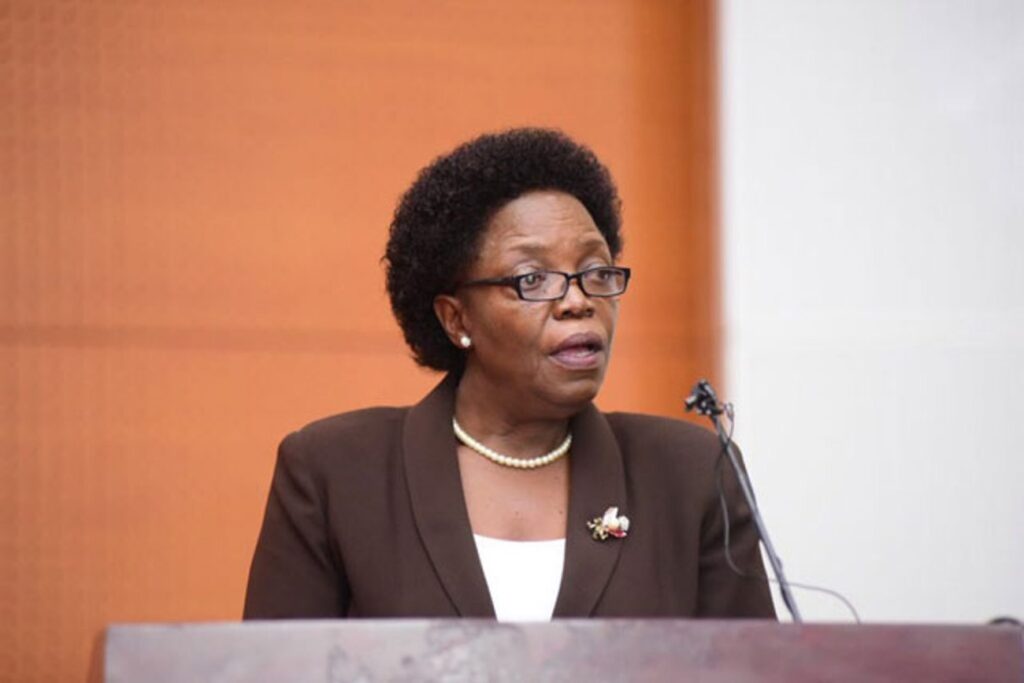
Prior to delivering the keynote address of the day, the Executive Director National Council for Higher Education (NCHE) Prof. Mary Okwakol thanked the Vice Chancellor, Prof. Barnabas Nawangwe for inviting her to the important forum, noting that women’s participation in decision making and governance is a priority area of the Uganda Gender Policy 2007.
She commended Makerere University for being at the forefront of gender mainstreaming in Uganda, noting that this prominence was one of the reasons why the Gender in Education Policy 2007 provides for replicating the institution’s strategy in all other Higher Education Institutions.
Prof. Okwakol whose keynote address was punctuated incisive personal examples reaffirmed the statistics that women are generally not visible in leadership of Universities. That notwithstanding, in instances where they rise to leadership and decision-making positions, they are regularly subject to roles traditionally deemed as women’s inconsiderate of their managerial seniority and experience.
She nevertheless rallied the women to play their respective roles in enhancing participation and visibility at a personal level. The following were some of the strategies she proposed; work hard to acquire academic credentials so as to compete favourably with men, acquire necessary administrative training and experience, network among women, join professional networks as well as do research and publish.
On joining professional networks, she shared her personal experience as a young zoologist who joined UNESCO’s Tropical Biology and Fertility Programme. “Within a short time I was appointed Coordinator for Africa and after two years, I was elected as a Member of the International Board of Management. After serving for two years, I became Vice Chairperson of that Board and finally I became Chairperson of that International Board.”
At the institutional level, Prof. Okwakol appealed to the Chairperson Council and Vice Chancellor to proactively recruit women who meet the requirements for leadership positions even if it means actively seeking out the reluctant ones. In this regard, she shared that it would be useful for the university to develop a database of women and their qualifications to ease this process.
She shared that NCHE has in recognition of female underrepresentation at every level in Higher Education approved the establishment of a Gender and Equity Unit with the aim of promoting inclusive gender participation in the sub-sector.
“This unit has been placed under the Directorate of Quality Assurance and Accreditation which implies that as we look out for and regulate quality, gender will be a very important aspect of that regulation” she reassured.
Prof. Okwakol concluded by urging participants to read the; Third National Development Plan (NDPIII), Uganda Vision 2040, and Sustainable Development Goals (SDGs) noting that there is no way all three can be achieved while women are left behind because they each make a case for inclusion of the female gender.
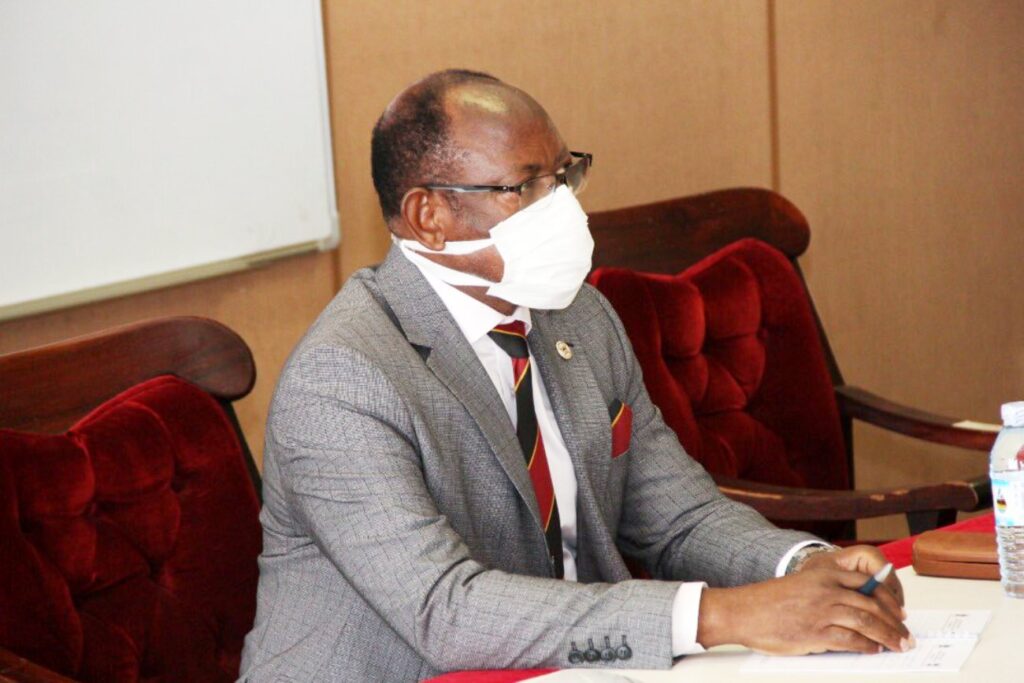
“What we are addressing here are historical injustices” said Prof. Barnabas Nawangwe as he commenced his remarks, “And in the case of Makerere University, it is well known that the institution started as a male-only institution and we all know the original motto was ‘Let us be men’” he added.
Citing examples from history such as; Marie Curie – one of the smartest physicists, Hatshepsut, Nefertiti and Cleopatra – prominent Pharaohs of Egypt, George Eliot, Rosa Luxemburg and Hypatia – all great philosophers as well as Chancellor Angela Merkel – first female Chancellor of Germany, the Vice Chancellor said there is no plausible argument that there are things women cannot do as well as their male counterparts.
He said it was against this knowledge and in a bid to correct historical injustices that Makerere University pioneered initiatives such as putting in place affirmative action for girls, establishing a Gender Mainstreaming Directorate as well as a School of Women and Gender Studies. The Vice Chancellor nevertheless stressed the need to go beyond pioneering to protecting these gains through legislation. “Historically we have seen that discrimination can only be addressed by laws and policies.”
Prof. Nawangwe thanked the Government for providing funds to support Mak-RIF as well as the Funds GMC and Secretariat for ensuring that these funds are put to good use. He equally thanked the Chairperson of Council, Mrs. Lorna Magara for her not only her support but also sparing time to attend a good number of the research dissemination events.
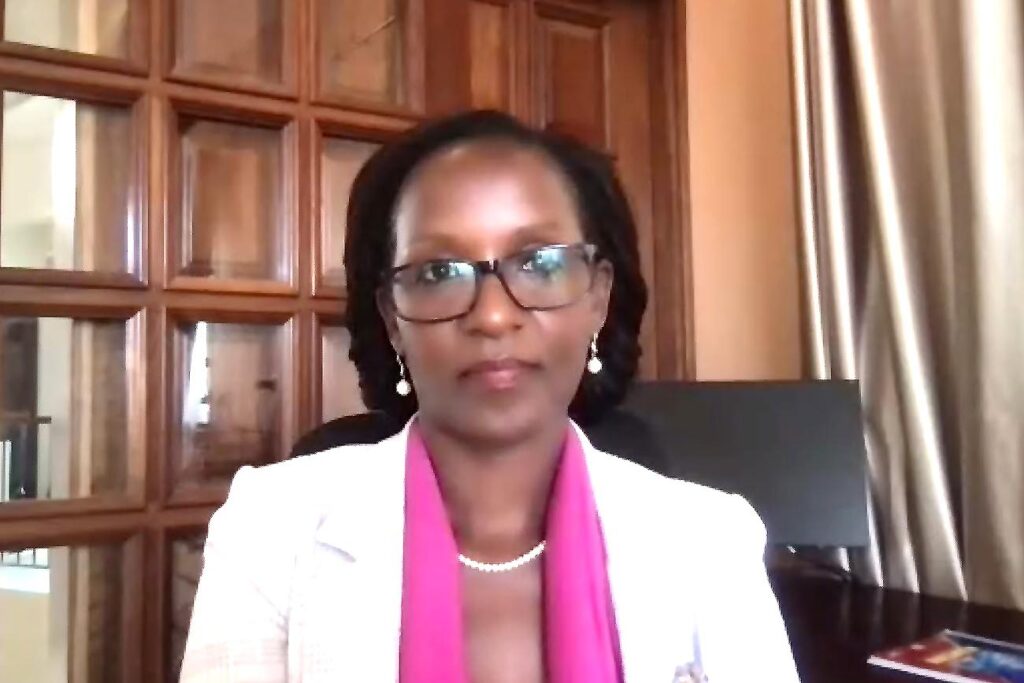
Delivering the concluding remarks, Mrs. Magara acknowledged that the study was timely and relevant the contemporary University, as one of the critical drivers of the national and international development agenda. She therefore reechoed the Vice Chancellor’s thanks to the Government of Uganda for generously supporting the University’s research through Mak-RIF.
Turning to the keynote speaker she said, “I thank Prof. Okwakol for ardently discussing the critical issues affecting the female gender, the strategies to overcome the challenges, including sharing her inspiring personal experiences.”
Mrs. Magara equally thanked Prof. Okwakol for her very instructional analysis, providing mentorship guidance with the resultant impact of enhancing the female gender in decision-making positions. In the same breath she congratulated the PI and her team upon successfully concluding phase one of the project.
“Phase one has generated insights in understanding the status of women in leadership in public universities, the legal and policy framework and its implications on women’s visibility, the institutional mentoring systems and the gaps therein” she observed.
The Chairperson of Council acknowledged that the challenge of underrepresentation of women in leadership roles cannot be resolved at an individual level. She therefore advocated for broad based strategies that can address deep-seated structural and cultural biases facing women. “These include developing mentorship networks, enacting laws and policies that address the imbalances and providing training programmes to address the leadership gaps.”
She therefore pledged the University Council’s unwavering support to the Gender Mainstreaming Programme by ensuring an enabling policy environment that facilitates gender-responsive teaching, learning, research innovation and community service.
The research dissemination was moderated by the Principal Public Relations Officer (PRO), Ms. Ritah Namisango and the Director Communications, Learning and Knowledge Management, ResilientAfrica Network (RAN) and PRO Mak-RIF, Ms. Harriet Adong.
You may like
-


Botswana Delegation Visits Makerere’s Public Investment Management Centre to Study Sustainable Training Model
-


Makerere University commemorates 13 transformative years of partnership with Mastercard Foundation
-


200 UVTAB students graduate: CEES emphasizes Skills, Integrity and Community Impact
-


Celebrating Academic Excellence: CoBAMS Presents 975 Graduands at Mak 76th Graduation Ceremony
-


Makerere’s 76th Graduation Ceremony: CHS showcases research strength with 26 PhD Graduates
-


Mak 76th Graduation Ceremony: CoNAS Presents 16 PhDs & Best Performing Male Student in the Sciences
General
Makerere University commemorates 13 transformative years of partnership with Mastercard Foundation
Published
2 days agoon
March 2, 2026
On Friday, 27th February 2026, Makerere University proudly celebrated 13 years of a significant partnership with the Mastercard Foundation, a prestigious independent organisation headquartered in Toronto, Canada. Since its inception in 2013 with the launch of the Scholars Program-currently headed by Prof. Justine Namaalwa, this collaboration has grown significantly, expanding to include two additional initiatives: The E-learning Initiative-headed by Prof. Paul Muyinda Birevu and the Africa Climate Collaborative-headed by Prof. Gorretie Nabanoga. This long-term partnership underscores the shared commitment to fostering education, innovation, and sustainability in Uganda and across Africa.
The colourful event coincided with the 76th Graduation Ceremony, during which Makerere University honoured Ms. Reeta Roy, the Founding President and CEO of the Mastercard Foundation, with an honorary Doctor of Laws.

In her commencement speech, Ms. Roy thanked Makerere University for considering a partnership with the Mastercard Foundation and for conferring upon her a prestigious honorary award.
“Mastercard Foundation is honoured to collaborate with this esteemed university, and I appreciate the recognition through this award. I am excited to be associated with Makerere University and look forward to actively embodying its values. Joining the broader community of alumni from this distinguished institution is a privilege, and I am eager to contribute to its legacy,” stated Ms. Roy.

During the reception in honour of Ms. Roy, the Chairperson of Makerere University Council, Dr. Lorna Magara, acknowledged the invaluable support from the Mastercard Foundation. She emphasised the profound impact of the Foundation’s various initiatives, particularly the scholarships for disadvantaged youth, which enable them to access higher education and opportunities that might have otherwise been beyond their reach.
“On behalf of the Makerere University Council and the broader University community, I extend our sincere gratitude to Mastercard Foundation for its commitment to collaborating with Makerere University in various endeavours, especially for providing scholarships to our underprivileged young people who would never have stepped inside a lecture room at the University.” Dr. Magara stated.

Dr. Magara, in a special way, thanked Ms. Roy for her transformative leadership and unwavering commitment to supporting young people in Africa, citing her efforts to ensure young people get their voices heard.
“As a university, our business is with young people. We are therefore committed to providing the environment and education that deliver meaningful pathways. We will provide an environment that ensures young people have a voice and agency to create meaningful change in society.” Dr. Magara pledged.

Dr. Magara further congratulated Ms. Roy on her honorary Doctor of Laws from Makerere University, noting that it is the university’s highest honour for individuals who have excelled in their careers.
“On behalf of the Makerere University community, I would like to extend my heartfelt congratulations on your honorary Doctor of Laws. This esteemed recognition represents the highest honour our institution can bestow on individuals who have demonstrated exceptional achievement and excellence across various facets of their career.” Dr. Magara remarked.
Prof. Justine Namaalwa, the Program Director of the Mastercard Foundation Scholars Program and the Coordinator for all Mastercard Foundation Initiatives at Makerere University, expressed her appreciation for the thirteen-year collaboration between Makerere University and the Mastercard Foundation. She highlighted that the partnership had yielded significant, impactful results.

“In 2013, Makerere University partnered with the Mastercard Foundation to educate the next generation of transformative African leaders who can positively impact their lives, their communities, and the economies of Africa. The partnership has had a significant impact. I thank the University Management and the Foundation team for this visionary collaboration,” remarked Prof. Namaalwa.
Prof. Namaalwa articulated that the partnership with the Mastercard Foundation is primarily focused on empowering young people as agents of change for transformational leadership in Africa. She presented compelling statistics demonstrating the positive impact of the scholars’ program, highlighting the success of individuals who have completed their education and their subsequent professional experiences after university graduation.

“This partnership focuses on young people, aiming to create positive change in their lives. To date, the Scholars Program has graduated 974 alumni, with 48% securing formal employment, 18% starting their own businesses, 8% participating in internships, and 5% pursuing further education. Overall, 72% of Scholar alumni are actively engaged in employment or entrepreneurship,” Prof. Namaalwa stated.
The colourful event showcased a dynamic array of activities that highlighted the entrepreneurial spirit of Scholars and alumni from the Mastercard Foundation at Makerere University. Attendees enjoyed a mini-exhibition featuring innovative products from these ventures.

A video documentary illustrated the positive impact of the three Mastercard Foundation initiatives. The event also featured inspiring poetry recitations by Scholars and a lively atmosphere of music and dance, creating an engaging and memorable experience for all participants.
The high-level event was attended by senior University officials, led by the Chairperson of Council, Dr. Lorna Magara; the Vice-Chancellor, Prof. Barnabas Nawangwe; the Vice-Chancellor, Academic Affairs, Prof. Sarah Ssali, Deputy, and the Ag. Deputy Vice-Chancellor, Finance and Administration Prof. Winston Tumps Ireeta. Mr Yusuf Kiranda, the University Secretary; and Prof. Buyinza Mukadasi, the Academic Registrar, Chancellor Emeritus-Prof. Ezra Suruma, former Chairperson of the Steering Committee of Mastercard Foundation Scholars Program-Prof. Umar Kakumba, and the Deputy Executive Secretary, RUFORUM, and former Program Coordinator of the Scholars Program at Makerere University-Dr. Florence Nakayiwa, among many other officials graced the function.

The event was also graced by a high-level delegation from the Mastercard Foundation, led by Ms. Reeta Roy, the Founding President of the Foundation, and included the Mastercard Foundation Teams from the Country offices in Kigali, Nairobi, and Kampala; the Program partners; the Mentors, Scholars and alumni; as well as the Program staff of the three Mastercard Foundation Initiatives at Makerere University.
At the end of the event, Makerere University honoured Ms. Reeta Roy with University memorabilia, including a pencil-drawn portrait, a pencil-drawn photo of the Ivory Tower, and other Ugandan crafts. Ms. Roy cut a graduation cake together with the 10 graduates of the 76th graduation ceremony from the Mastercard Foundation Scholars Program.
Bernard Buteera is the Principal Public Relations Officer for the Mastercard Foundation Scholars Program at Makerere University.

It is with great pleasure that I welcome you to this edition of Mak News Magazine, a publication that continues to chronicle Makerere University’s journey as a centre of academic excellence, innovation, and societal transformation.
The stories featured in this issue vividly demonstrate Makerere’s unwavering commitment to addressing national, regional, and global challenges through research, partnerships, and people-centred solutions. They reflect a university that is deeply engaged with society, one that applies knowledge not only to advance scholarship, but also to improve lives.
A recurring theme in this edition is innovation for resilience and inclusion. From the College of Agricultural and Environmental Sciences’ Healthy Soy Initiative combating child malnutrition amid climate change, to the cutting-edge work of CEDAT’s Team Green Minds integrating IoT into agriculture, Makerere continues to harness science and technology to respond to pressing development needs. Equally inspiring is the College of Natural Sciences’ success in securing international funding to scale up fish processing technologies, with a deliberate focus on empowering women and strengthening livelihoods.
This issue also highlights Makerere’s growing role in advancing health and wellbeing. The launch of the Early Intervention Psychiatry Services Clinic at Makerere University Hospital marks an important step in strengthening mental health services, while the Hospital’s transformation from a modest sickbay into a centre of excellence stands as a testament to decades of strategic investment, dedication, and service to the nation.
Our commitment to education access and global engagement is equally evident. Strategic partnerships, such as that between the College of Education and External Studies and the Uganda Vocational and Technical Assessment Board, are expanding pathways to quality education. The establishment of the first-ever United States Studies Centre in the Great Lakes Region positions Makerere as a hub for dialogue, research, and policy engagement on global affairs. We also celebrate our vibrant international community, with graduates drawn from 67 nationalities—affirming Makerere’s status as a truly global university.
This edition further showcases initiatives that ensure long-term institutional sustainability, including the launch of the CoCIS Endowment Fund, infrastructure developments such as the modern hostel at Buyana Farm, and transformative programmes supported by the Mastercard Foundation that continue to empower young people across the continent.
As you read through these pages, I invite you to reflect on the collective effort of our students, staff, alumni, partners, and supporters whose contributions make these achievements possible. Together, we continue to shape Makerere University as a place where knowledge serves humanity.
I wish you an engaging and inspiring read.
Prof. Barnabas Nawangwe
VICE CHANCELLOR

The Board Chairperson of the Makerere University Endowment Fund (MakEF), Dr. Margaret Blick Kigozi, has urged graduands in Health and Life Sciences to uphold professional ethics and serve humanity with diligence and compassion.
Her appeal came during the passing out of graduates from the College of Natural Sciences (CoNAS), the College of Veterinary Medicine, Animal Resources and Bio-Security (CoVAB), the College of Health Sciences (CHS) and the School of Public Health (SPH) on Day Two of the 76th Graduation Ceremony of Makerere University.
“Class of 2026, you are now part of the Makerere legacy. Wherever you go clinics, laboratories, farms, boardrooms, or classrooms, you carry this institution with you. Serve your patients with skill and compassion. Care for animals and communities responsibly. Question boldly and keep learning,” Dr Kigozi, said.
Delivering the commencement address, Dr. Kigozi lauded the graduates for their dedication to careers that directly impact lives and communities. She encouraged them to use their knowledge generously and exercise their power gently.
“Your education has trained you to ask better questions. Your humanity must guide the answers. Never forget that behind every chart, every case, every animal, every experiment, there is life. And life deserves care, patience, and dignity. Give every person you come in contact with care, patience and dignity,” Dr Kigozi, noted.
As the graduates embark on their professional journeys, Dr. Kigozi emphasized the importance of cultivating basic business acumen and financial literacy to ensure sustainability in their work.

“You do not need to become accountants but you must be able to read the essentials: understand simple financial statements, budgets and key metrics so you can judge whether a clinic, lab, or program is sustainable. You are encouraged to start your business. There are numerous investment opportunities in your areas of training. You can provide services to our people and create jobs,” Dr Kigozi, said.
She shared candidly how, when she first stepped into leadership, she realised she did not understand balance sheets or budgets well enough. So, she returned to Makerere for short courses to strengthen herself.
“A well-run Hospital, clinic or lab delivers better outcomes, attracts staff, and secures funding. Business savvy is not only about profit, it’s about sustainability and the freedom to serve ethically and effectively. Carry clinical skill with business sense so your work endures and grows,” Dr. Kigozi, noted.
Quoting renowned writer and producer Shonda Rhimes, creator of Grey’s Anatomy, who once reflected that succeeding in one area of life can sometimes mean falling short in another, Dr. Kigozi encouraged women graduates to intentionally balance professional ambition with family responsibilities.
“When one area thrives, another is often under strain. When Navio was graduating from school I had to manage the Presidential Investor Round Table on the same day as Executive Director Uganda Investment Authority. I chose my job and delegated his siblings to attend Navios graduation. I learnt from this. I choose family always after that thing you achieve once and keep forever,” Dr Kigozi, said.
In his speech, the Prof Barnabas Nawangwe, the Vice Chancellor, informed the congregation that Makerere’s ranking on all university ranking platforms has remained stable, placing Makerere among the top 10 African universities and within the top 4.5% globally.
“In the Times Higher Education global ranking, Makerere University made a formidable jump from the 1200-1500 bracket to the 800-1000 bracket. This was no mean achievement and I congratulate all members of the Makerere Community on this stellar performance,” Prof Nawangwe, said.
Trending
-

 Humanities & Social Sciences1 week ago
Humanities & Social Sciences1 week agoMeet Najjuka Whitney, The Girl Who Missed Law and Found Her Voice
-

 General1 week ago
General1 week ago76th Graduation Highlights
-

 Health2 weeks ago
Health2 weeks agoUganda has until 2030 to end Open Defecation as Ntaro’s PhD Examines Kabale’s Progress
-

 Agriculture & Environment2 weeks ago
Agriculture & Environment2 weeks agoUganda Martyrs Namugongo Students Turn Organic Waste into Soap in an Innovative School Project on Sustainable Waste Management
-

 General2 weeks ago
General2 weeks agoMastercard Foundation Scholars embrace and honour their rich cultural diversity
